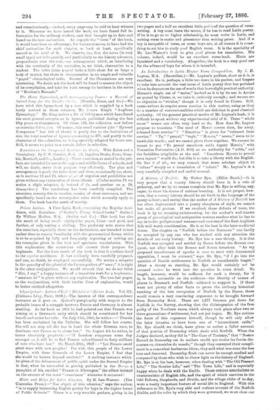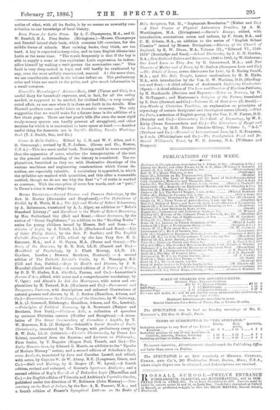A History of Norfolk. By Walter Rye. (Elliot Stock.)—lt is
very proper that a county history should have in it a vein- of pedantry, and we by no means complain that Mr. Rye is willing, nay, eager, to show his stores of carious learning. It is not proper, how- ever, that a county history should be set forth in the language of the penny-a-liner ; and seeing that the author of A History of Norfolk has too often degenerated into a jaunty slanginess of style, we cannot but make all protest. If we overlook these defects of taste, the book is by no meaning uninteresting, for the author's well-known grasp of genealogical and antiquarian matters renders what he has to say as to the pedigrees and manners and customs of the East Anglican folk well worth consideration. He is at his best in the later medimval times. The chapter on "Norfolk before the Normans" can hardly be accepted by any one who has studied with any attention the details of our early history. Mr. Rye has a new theory. It is that Norfolk was occupied and settled by Danes before the Roman con- quest, not after both the Roman and Saxon invasions. "As my proposed transference of epochs is sure to meet with determined opposition, I must be excused," says Mr. Rye, "if I go into the question of Danish settlements in Norfolk at considerable length." After a theory so startling, Mr. Rye would certainly not be excused unless he went into the question in some detail. No length, however, would be sufficent for such a theory, for it is, in fact, untenable on the evidence—the identity of names of places in Denmark and Norfolk—adduced to support it. If there were not plenty of other facts to prove the ordinary historical teaching of the late occnpation of Norfolk by the Danes, there would remain a very convincing argument to be brought forward from Doomsday Book. There are 4,277 freemen put down for Norfolk in the Sarvey, showing that the disintegration of the free polity of the Northern races, which always took place after two or three generations of settlement, had not yet begun. Mr. Rye notices the force of this argument himself, though he will only allow the later invasion to have been one of "intermittent raids." Mr. Rye should, we think, have given us rather a fuller account of that portion of Doomsday which deals with Norfolk. When the Judges declared, as they did in "The Case of Tanistry," that "Nostra Record de Domesday eat de meilnre credit que toutes les forein dis- courses ou chronicles du monde," though they conveyed their compli- ment in a somewhat barbarous idiom, they said what was none the less true and deserved. Doomsday Book can never be enough studied and compared by those who wish to throw light on the history of England. Mr. Rye is at his best, however, when dealing with "The Old Peasant Life," "The Gentler Life," and "The Town Life," and is especially happy when he deals with the Gnildø. Moe° carious associations so characteristic of English life, and the spirit of which survives in the Odd Fellows, Shepherds, and Druids, and the village clubs of to-day, were a vastly important feature of social life in England. With this reference to Mr. Rye's very able and curious account of the Norfolk Guilds, and the rules by which they were governed, we must close our
notice of what, with all its faults, is by no means an unworthy eon- tribation to our knowledge of local history.



































 Previous page
Previous page